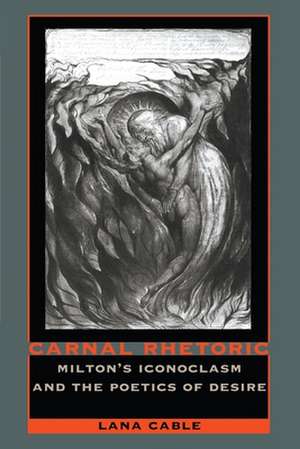Carnal Rhetoric – Milton′s Iconoclasm and the Poetics of Desire
Autor Lana Cableen Limba Engleză Paperback – 27 feb 1995
Cable traces the development of Milton's iconoclastic poetics from its roots in the antiprelatical tracts, through the divorce tracts and "Areopagitica," to its fullest dramatic representation in "Eikonoklastes" and "Samson Agonistes." Arguing that, like every creative act, metaphor is by nature a radical and self-transgressing agent of change, she explores the site where metaphoric language and imaginative desire merge. Examining the demands Milton places on metaphor, particularly his emphasis on language as a vehicle for mortal redemption, Cable demonstrates the ways in which metaphor acts for him as that creative and radical agent of change. In the process, she reveals Milton's engagement, at the deepest levels of linguistic creativity, with the early modern commitment to an imaginative and historic remaking of the world.
An insightful and synthetic book, "Carnal Rhetoric" will appeal to scholars of English literature, Milton, and the Renaissance, as well as to those with an interest in the theory of affective stylistics as it pertains to reader-response criticism, semantics, epistemology, and the philosophy and psychology of language.
Preț: 238.23 lei
Nou
Puncte Express: 357
Preț estimativ în valută:
45.59€ • 47.72$ • 37.94£
45.59€ • 47.72$ • 37.94£
Carte tipărită la comandă
Livrare economică 31 martie-14 aprilie
Preluare comenzi: 021 569.72.76
Specificații
ISBN-13: 9780822315735
ISBN-10: 0822315734
Pagini: 248
Dimensiuni: 146 x 234 x 15 mm
Greutate: 0.34 kg
Editura: MD – Duke University Press
ISBN-10: 0822315734
Pagini: 248
Dimensiuni: 146 x 234 x 15 mm
Greutate: 0.34 kg
Editura: MD – Duke University Press
Textul de pe ultima copertă
"This is an exciting book to read. Cable's "Carnal Rhetoric" is one of the foremost statements concerning the 'theory' of affective stylistics and the contribution that it provides to our understanding of Milton's writings and, by implication, the writings of others. By positing a sensory, emotional, and affective theory of metaphor and figurative language, Cable strikes out in a radically new direction in Milton studies."--Albert Labriola, Duquesne University
